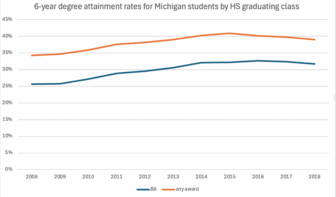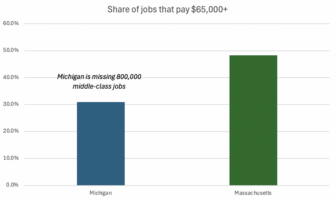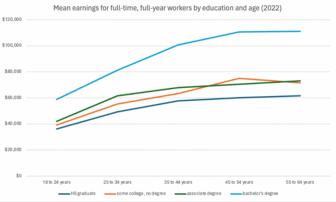If Michigan is going to be broadly prosperous again, it’s imperative that we reduce barriers to people who want to participate in the workforce. More and more research shows that time behind bars—even a few days in a local jail—can significantly impact a person’s ability to find and keep a job, maintain housing, and pursue any life-improving activities, like getting an education.
Michigan arrested more than 13,000 juveniles in 2013, according to this report from the Michigan Committee on Juvenile Justice (Michigan is one of nine states that tries 17-year-olds as adults–a policy the state house has voted to end–so these numbers don’t represent the full picture). Black youth are arrested at rates three times those of white youth.
Not surprisingly, the futures of teenagers who are arrested are as fragile as those of adults. Too often, young people who commit a crime see it follow them for years. As someone who was once a teenager myself, it feels unjust for a non-violent mistake at 16 to have lifetime impacts—especially if the “criminal” is someone who has already been dealt a rough hand, like a childhood in poverty and at poor schools. But it doesn’t just tug the heartstrings; looked at with a clear eye, it begs the question of how kids who start life behind can ever catch up when we keep holding them back?
That’s why I was so interested in the model of Florida’s civil citation program for juveniles who are first-time, non-violent misdemeanor offenders. The program was piloted in Miami-Dade County in 2007, and rolled out statewide in 2015. For these young offenders, instead of being arrested, they are allowed to enroll in the civil citation program, which includes a variety of psychosocial assessments followed by appropriate interventions to help them get their lives back on track. These interventions include family counseling and drug testing, and sanctions such as education and community service. If the youth completes the program, the original arrest is not filed or adjudicated, and she avoids a criminal record.
According to Florida’s online Civil Citation Dashboard, between June 2015 and May 2016, 48 percent of eligible youth were issued civil citations rather than being arrested. The costs to the state related to a civil citation are an average of $386 per offense, vs. $5,000 for processing a youth through the juvenile justice system. A report from the American Bar Association suggests that the program has significantly reduced youth recidivism. In Miami-Dade County, while the program was being piloted, youth arrests dropped 23% while youth arrests statewide dropped only 3%.
Michigan should consider unrolling a similar program that can help young people readjust when they get off track. It’s good for them, and good for the state.







